Advertising and Offer in Products: Brazil Consumer Protection Code
VerifiedAdded on 2023/01/12
|12
|3313
|78
Report
AI Summary
This report provides a comprehensive overview of the Brazilian Consumer Protection Code (CDC), specifically focusing on the regulation of advertising and product offers. It details how the CDC aims to balance consumer-supplier relationships and protect consumer rights. The report explores key aspects of the code, including the definition of offers and advertisements, emphasizing that suppliers must adhere to accurate and non-deceptive practices. It outlines the consequences for suppliers who fail to fulfill offers or engage in misleading advertising, including consumer rights to demand fulfillment, seek equivalent products, breach contracts, and claim damages. The report also examines the concept of deceptive advertising, detailing how it can interfere with consumer decision-making and outlines the various causes of action available to consumers, such as fault or unclear information, defective products, and misleading advertising. The report also highlights the responsibilities and liabilities of suppliers, including potential criminal liabilities for violations, and the importance of compliance with the Brazilian consumer laws for foreign investors. The report concludes by emphasizing the importance of consumer protection and the legal remedies available to consumers under the CDC, contributing to a deeper understanding of consumer rights and advertising regulations in Brazil.
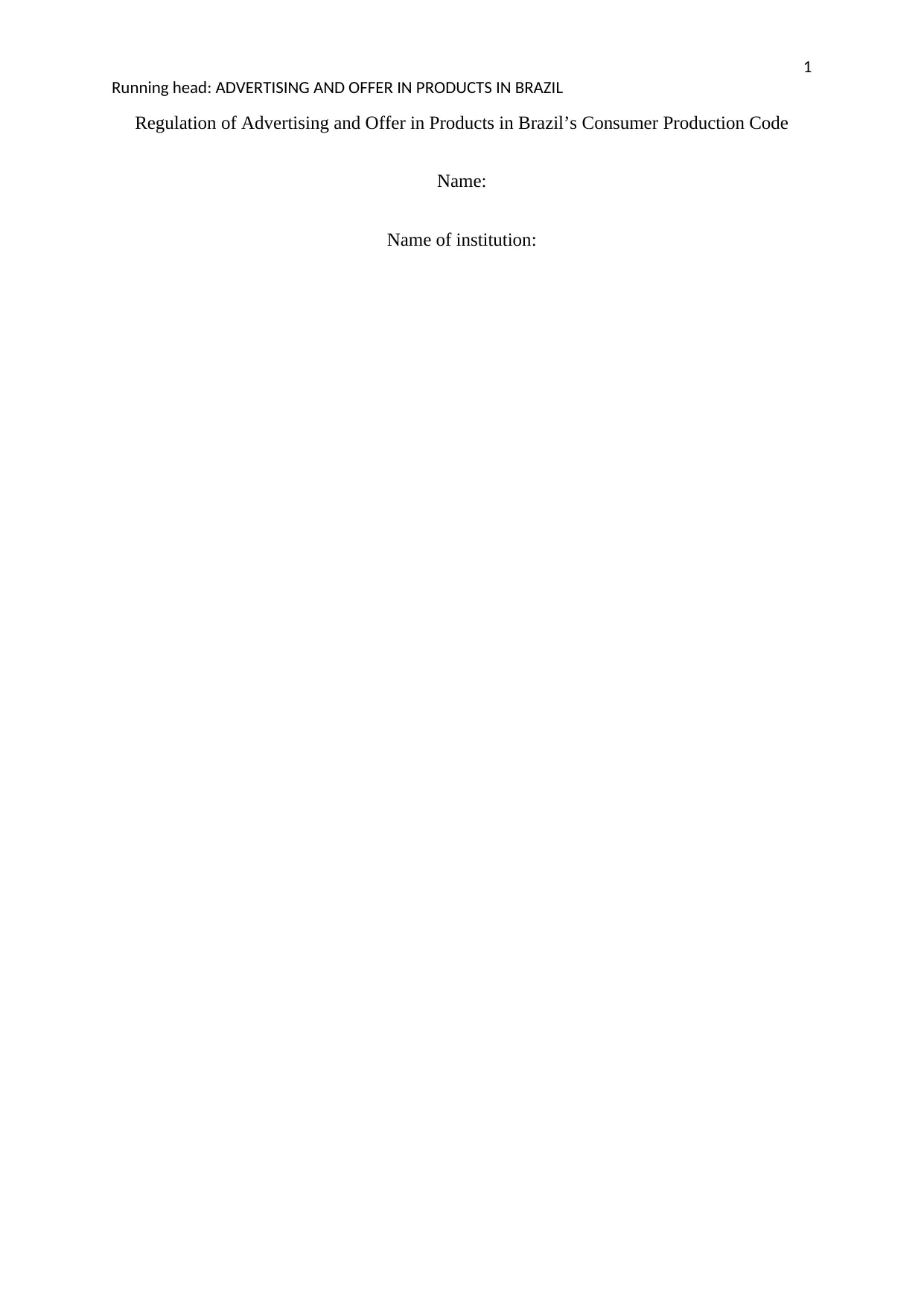
1
Running head: ADVERTISING AND OFFER IN PRODUCTS IN BRAZIL
Regulation of Advertising and Offer in Products in Brazil’s Consumer Production Code
Name:
Name of institution:
Running head: ADVERTISING AND OFFER IN PRODUCTS IN BRAZIL
Regulation of Advertising and Offer in Products in Brazil’s Consumer Production Code
Name:
Name of institution:
Paraphrase This Document
Need a fresh take? Get an instant paraphrase of this document with our AI Paraphraser
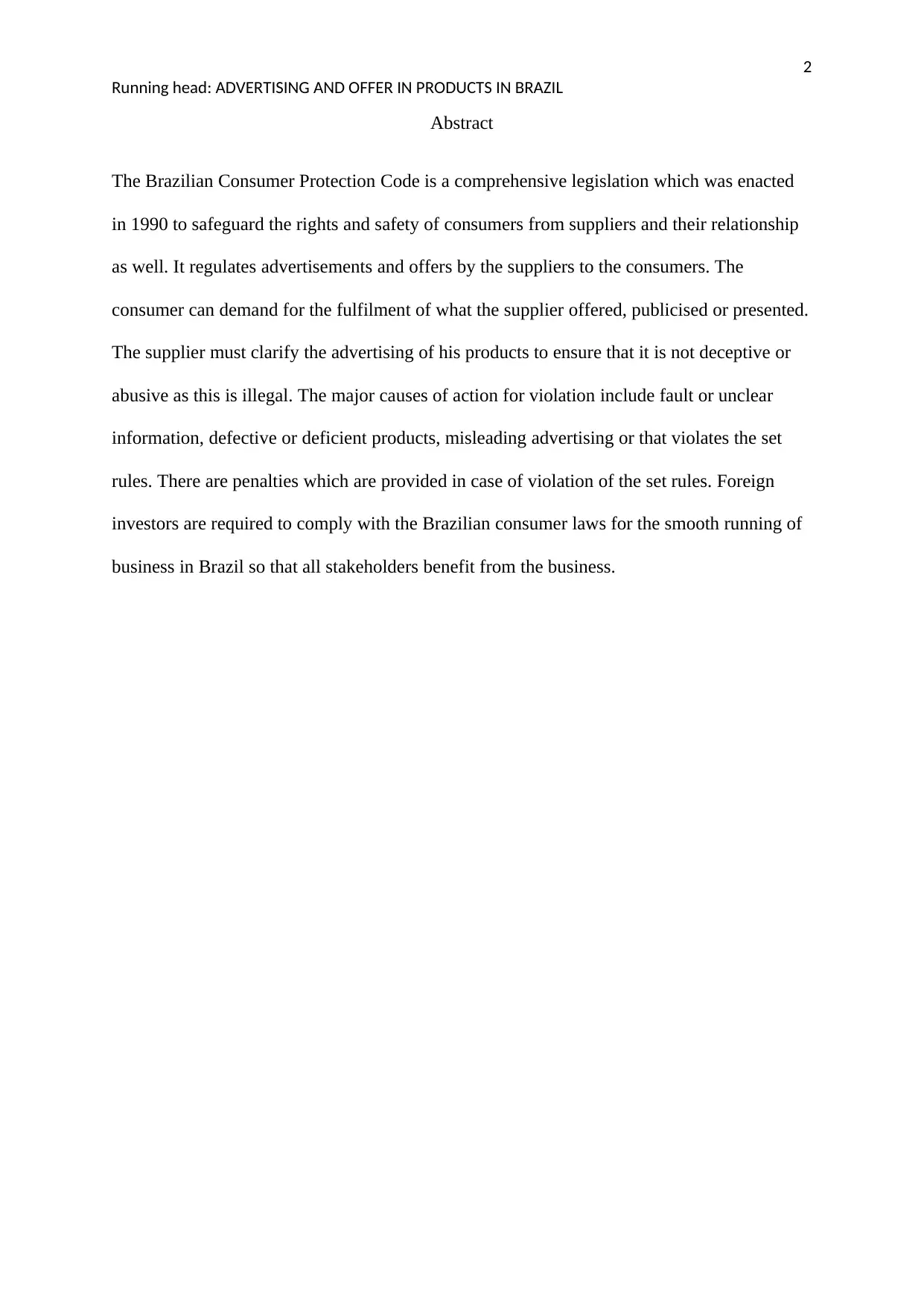
2
Running head: ADVERTISING AND OFFER IN PRODUCTS IN BRAZIL
Abstract
The Brazilian Consumer Protection Code is a comprehensive legislation which was enacted
in 1990 to safeguard the rights and safety of consumers from suppliers and their relationship
as well. It regulates advertisements and offers by the suppliers to the consumers. The
consumer can demand for the fulfilment of what the supplier offered, publicised or presented.
The supplier must clarify the advertising of his products to ensure that it is not deceptive or
abusive as this is illegal. The major causes of action for violation include fault or unclear
information, defective or deficient products, misleading advertising or that violates the set
rules. There are penalties which are provided in case of violation of the set rules. Foreign
investors are required to comply with the Brazilian consumer laws for the smooth running of
business in Brazil so that all stakeholders benefit from the business.
Running head: ADVERTISING AND OFFER IN PRODUCTS IN BRAZIL
Abstract
The Brazilian Consumer Protection Code is a comprehensive legislation which was enacted
in 1990 to safeguard the rights and safety of consumers from suppliers and their relationship
as well. It regulates advertisements and offers by the suppliers to the consumers. The
consumer can demand for the fulfilment of what the supplier offered, publicised or presented.
The supplier must clarify the advertising of his products to ensure that it is not deceptive or
abusive as this is illegal. The major causes of action for violation include fault or unclear
information, defective or deficient products, misleading advertising or that violates the set
rules. There are penalties which are provided in case of violation of the set rules. Foreign
investors are required to comply with the Brazilian consumer laws for the smooth running of
business in Brazil so that all stakeholders benefit from the business.
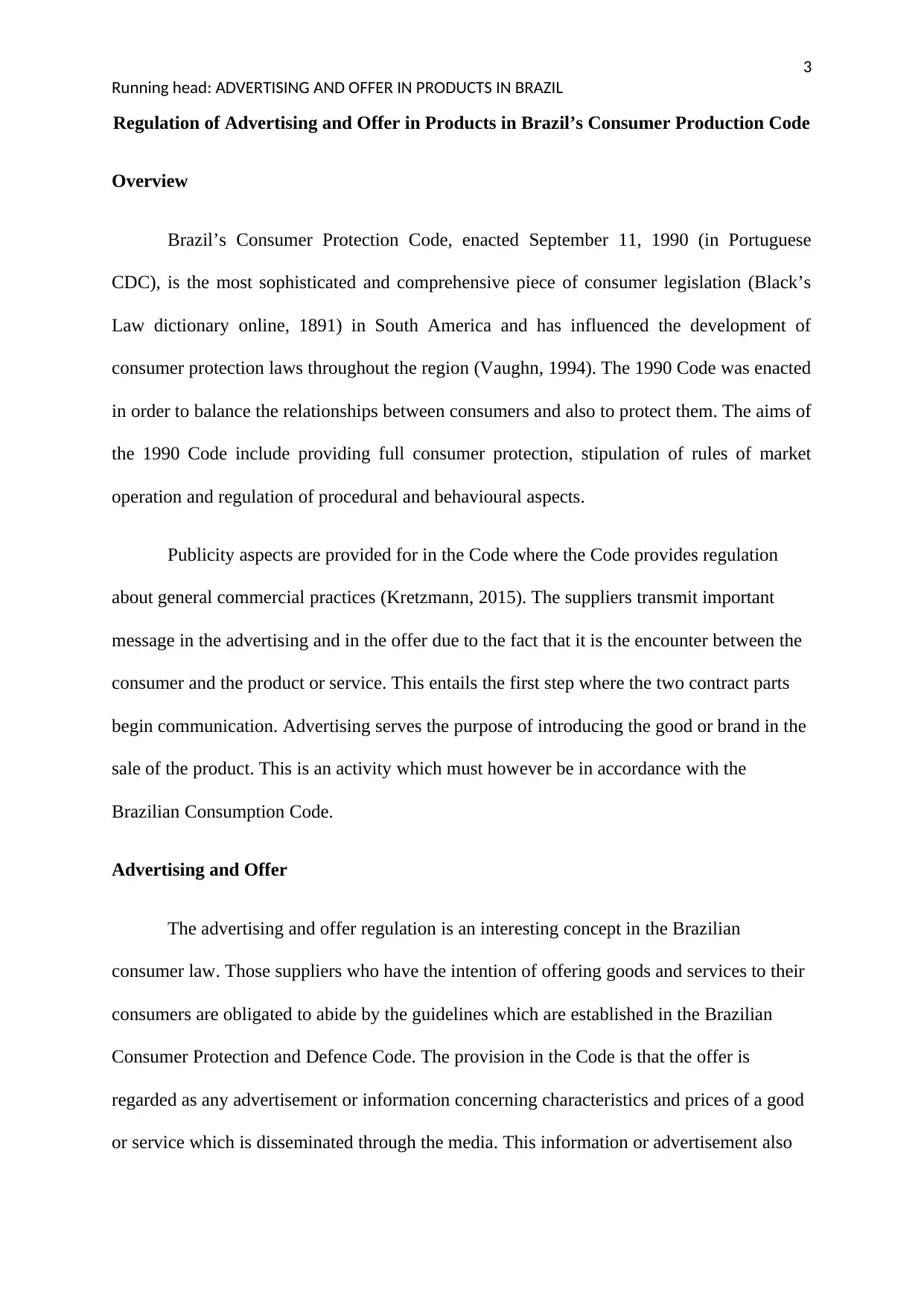
3
Running head: ADVERTISING AND OFFER IN PRODUCTS IN BRAZIL
Regulation of Advertising and Offer in Products in Brazil’s Consumer Production Code
Overview
Brazil’s Consumer Protection Code, enacted September 11, 1990 (in Portuguese
CDC), is the most sophisticated and comprehensive piece of consumer legislation (Black’s
Law dictionary online, 1891) in South America and has influenced the development of
consumer protection laws throughout the region (Vaughn, 1994). The 1990 Code was enacted
in order to balance the relationships between consumers and also to protect them. The aims of
the 1990 Code include providing full consumer protection, stipulation of rules of market
operation and regulation of procedural and behavioural aspects.
Publicity aspects are provided for in the Code where the Code provides regulation
about general commercial practices (Kretzmann, 2015). The suppliers transmit important
message in the advertising and in the offer due to the fact that it is the encounter between the
consumer and the product or service. This entails the first step where the two contract parts
begin communication. Advertising serves the purpose of introducing the good or brand in the
sale of the product. This is an activity which must however be in accordance with the
Brazilian Consumption Code.
Advertising and Offer
The advertising and offer regulation is an interesting concept in the Brazilian
consumer law. Those suppliers who have the intention of offering goods and services to their
consumers are obligated to abide by the guidelines which are established in the Brazilian
Consumer Protection and Defence Code. The provision in the Code is that the offer is
regarded as any advertisement or information concerning characteristics and prices of a good
or service which is disseminated through the media. This information or advertisement also
Running head: ADVERTISING AND OFFER IN PRODUCTS IN BRAZIL
Regulation of Advertising and Offer in Products in Brazil’s Consumer Production Code
Overview
Brazil’s Consumer Protection Code, enacted September 11, 1990 (in Portuguese
CDC), is the most sophisticated and comprehensive piece of consumer legislation (Black’s
Law dictionary online, 1891) in South America and has influenced the development of
consumer protection laws throughout the region (Vaughn, 1994). The 1990 Code was enacted
in order to balance the relationships between consumers and also to protect them. The aims of
the 1990 Code include providing full consumer protection, stipulation of rules of market
operation and regulation of procedural and behavioural aspects.
Publicity aspects are provided for in the Code where the Code provides regulation
about general commercial practices (Kretzmann, 2015). The suppliers transmit important
message in the advertising and in the offer due to the fact that it is the encounter between the
consumer and the product or service. This entails the first step where the two contract parts
begin communication. Advertising serves the purpose of introducing the good or brand in the
sale of the product. This is an activity which must however be in accordance with the
Brazilian Consumption Code.
Advertising and Offer
The advertising and offer regulation is an interesting concept in the Brazilian
consumer law. Those suppliers who have the intention of offering goods and services to their
consumers are obligated to abide by the guidelines which are established in the Brazilian
Consumer Protection and Defence Code. The provision in the Code is that the offer is
regarded as any advertisement or information concerning characteristics and prices of a good
or service which is disseminated through the media. This information or advertisement also
⊘ This is a preview!⊘
Do you want full access?
Subscribe today to unlock all pages.

Trusted by 1+ million students worldwide
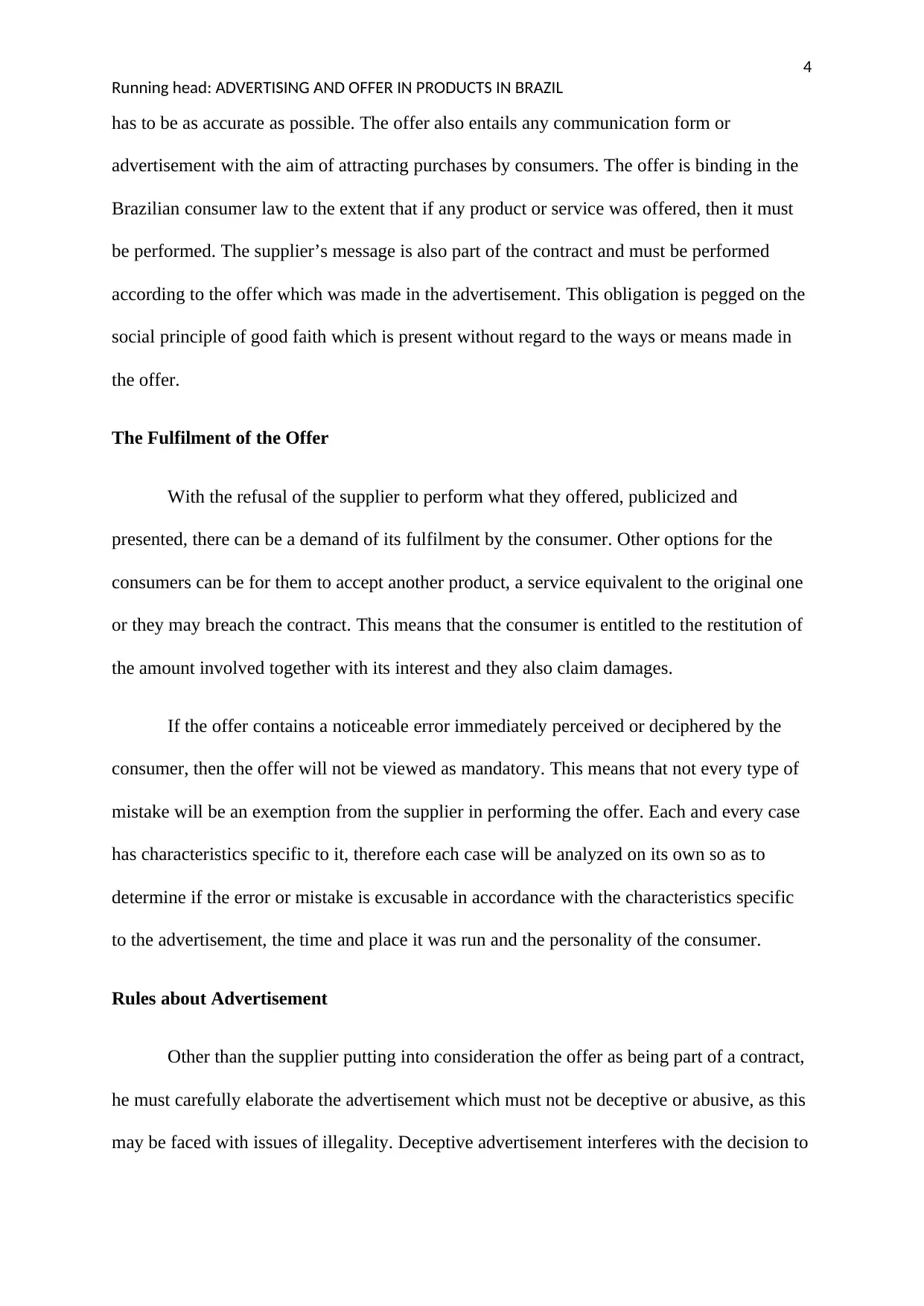
4
Running head: ADVERTISING AND OFFER IN PRODUCTS IN BRAZIL
has to be as accurate as possible. The offer also entails any communication form or
advertisement with the aim of attracting purchases by consumers. The offer is binding in the
Brazilian consumer law to the extent that if any product or service was offered, then it must
be performed. The supplier’s message is also part of the contract and must be performed
according to the offer which was made in the advertisement. This obligation is pegged on the
social principle of good faith which is present without regard to the ways or means made in
the offer.
The Fulfilment of the Offer
With the refusal of the supplier to perform what they offered, publicized and
presented, there can be a demand of its fulfilment by the consumer. Other options for the
consumers can be for them to accept another product, a service equivalent to the original one
or they may breach the contract. This means that the consumer is entitled to the restitution of
the amount involved together with its interest and they also claim damages.
If the offer contains a noticeable error immediately perceived or deciphered by the
consumer, then the offer will not be viewed as mandatory. This means that not every type of
mistake will be an exemption from the supplier in performing the offer. Each and every case
has characteristics specific to it, therefore each case will be analyzed on its own so as to
determine if the error or mistake is excusable in accordance with the characteristics specific
to the advertisement, the time and place it was run and the personality of the consumer.
Rules about Advertisement
Other than the supplier putting into consideration the offer as being part of a contract,
he must carefully elaborate the advertisement which must not be deceptive or abusive, as this
may be faced with issues of illegality. Deceptive advertisement interferes with the decision to
Running head: ADVERTISING AND OFFER IN PRODUCTS IN BRAZIL
has to be as accurate as possible. The offer also entails any communication form or
advertisement with the aim of attracting purchases by consumers. The offer is binding in the
Brazilian consumer law to the extent that if any product or service was offered, then it must
be performed. The supplier’s message is also part of the contract and must be performed
according to the offer which was made in the advertisement. This obligation is pegged on the
social principle of good faith which is present without regard to the ways or means made in
the offer.
The Fulfilment of the Offer
With the refusal of the supplier to perform what they offered, publicized and
presented, there can be a demand of its fulfilment by the consumer. Other options for the
consumers can be for them to accept another product, a service equivalent to the original one
or they may breach the contract. This means that the consumer is entitled to the restitution of
the amount involved together with its interest and they also claim damages.
If the offer contains a noticeable error immediately perceived or deciphered by the
consumer, then the offer will not be viewed as mandatory. This means that not every type of
mistake will be an exemption from the supplier in performing the offer. Each and every case
has characteristics specific to it, therefore each case will be analyzed on its own so as to
determine if the error or mistake is excusable in accordance with the characteristics specific
to the advertisement, the time and place it was run and the personality of the consumer.
Rules about Advertisement
Other than the supplier putting into consideration the offer as being part of a contract,
he must carefully elaborate the advertisement which must not be deceptive or abusive, as this
may be faced with issues of illegality. Deceptive advertisement interferes with the decision to
Paraphrase This Document
Need a fresh take? Get an instant paraphrase of this document with our AI Paraphraser
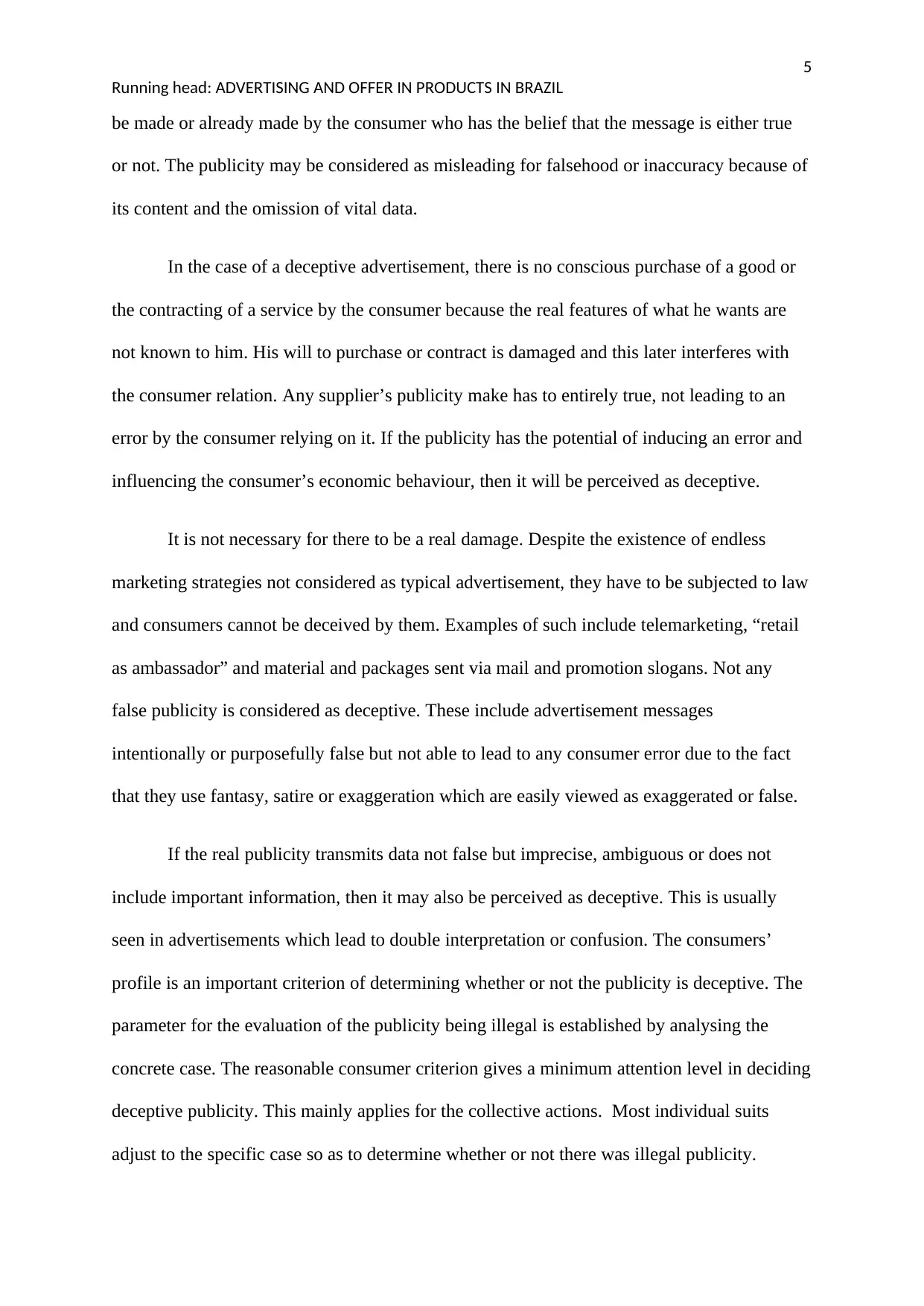
5
Running head: ADVERTISING AND OFFER IN PRODUCTS IN BRAZIL
be made or already made by the consumer who has the belief that the message is either true
or not. The publicity may be considered as misleading for falsehood or inaccuracy because of
its content and the omission of vital data.
In the case of a deceptive advertisement, there is no conscious purchase of a good or
the contracting of a service by the consumer because the real features of what he wants are
not known to him. His will to purchase or contract is damaged and this later interferes with
the consumer relation. Any supplier’s publicity make has to entirely true, not leading to an
error by the consumer relying on it. If the publicity has the potential of inducing an error and
influencing the consumer’s economic behaviour, then it will be perceived as deceptive.
It is not necessary for there to be a real damage. Despite the existence of endless
marketing strategies not considered as typical advertisement, they have to be subjected to law
and consumers cannot be deceived by them. Examples of such include telemarketing, “retail
as ambassador” and material and packages sent via mail and promotion slogans. Not any
false publicity is considered as deceptive. These include advertisement messages
intentionally or purposefully false but not able to lead to any consumer error due to the fact
that they use fantasy, satire or exaggeration which are easily viewed as exaggerated or false.
If the real publicity transmits data not false but imprecise, ambiguous or does not
include important information, then it may also be perceived as deceptive. This is usually
seen in advertisements which lead to double interpretation or confusion. The consumers’
profile is an important criterion of determining whether or not the publicity is deceptive. The
parameter for the evaluation of the publicity being illegal is established by analysing the
concrete case. The reasonable consumer criterion gives a minimum attention level in deciding
deceptive publicity. This mainly applies for the collective actions. Most individual suits
adjust to the specific case so as to determine whether or not there was illegal publicity.
Running head: ADVERTISING AND OFFER IN PRODUCTS IN BRAZIL
be made or already made by the consumer who has the belief that the message is either true
or not. The publicity may be considered as misleading for falsehood or inaccuracy because of
its content and the omission of vital data.
In the case of a deceptive advertisement, there is no conscious purchase of a good or
the contracting of a service by the consumer because the real features of what he wants are
not known to him. His will to purchase or contract is damaged and this later interferes with
the consumer relation. Any supplier’s publicity make has to entirely true, not leading to an
error by the consumer relying on it. If the publicity has the potential of inducing an error and
influencing the consumer’s economic behaviour, then it will be perceived as deceptive.
It is not necessary for there to be a real damage. Despite the existence of endless
marketing strategies not considered as typical advertisement, they have to be subjected to law
and consumers cannot be deceived by them. Examples of such include telemarketing, “retail
as ambassador” and material and packages sent via mail and promotion slogans. Not any
false publicity is considered as deceptive. These include advertisement messages
intentionally or purposefully false but not able to lead to any consumer error due to the fact
that they use fantasy, satire or exaggeration which are easily viewed as exaggerated or false.
If the real publicity transmits data not false but imprecise, ambiguous or does not
include important information, then it may also be perceived as deceptive. This is usually
seen in advertisements which lead to double interpretation or confusion. The consumers’
profile is an important criterion of determining whether or not the publicity is deceptive. The
parameter for the evaluation of the publicity being illegal is established by analysing the
concrete case. The reasonable consumer criterion gives a minimum attention level in deciding
deceptive publicity. This mainly applies for the collective actions. Most individual suits
adjust to the specific case so as to determine whether or not there was illegal publicity.
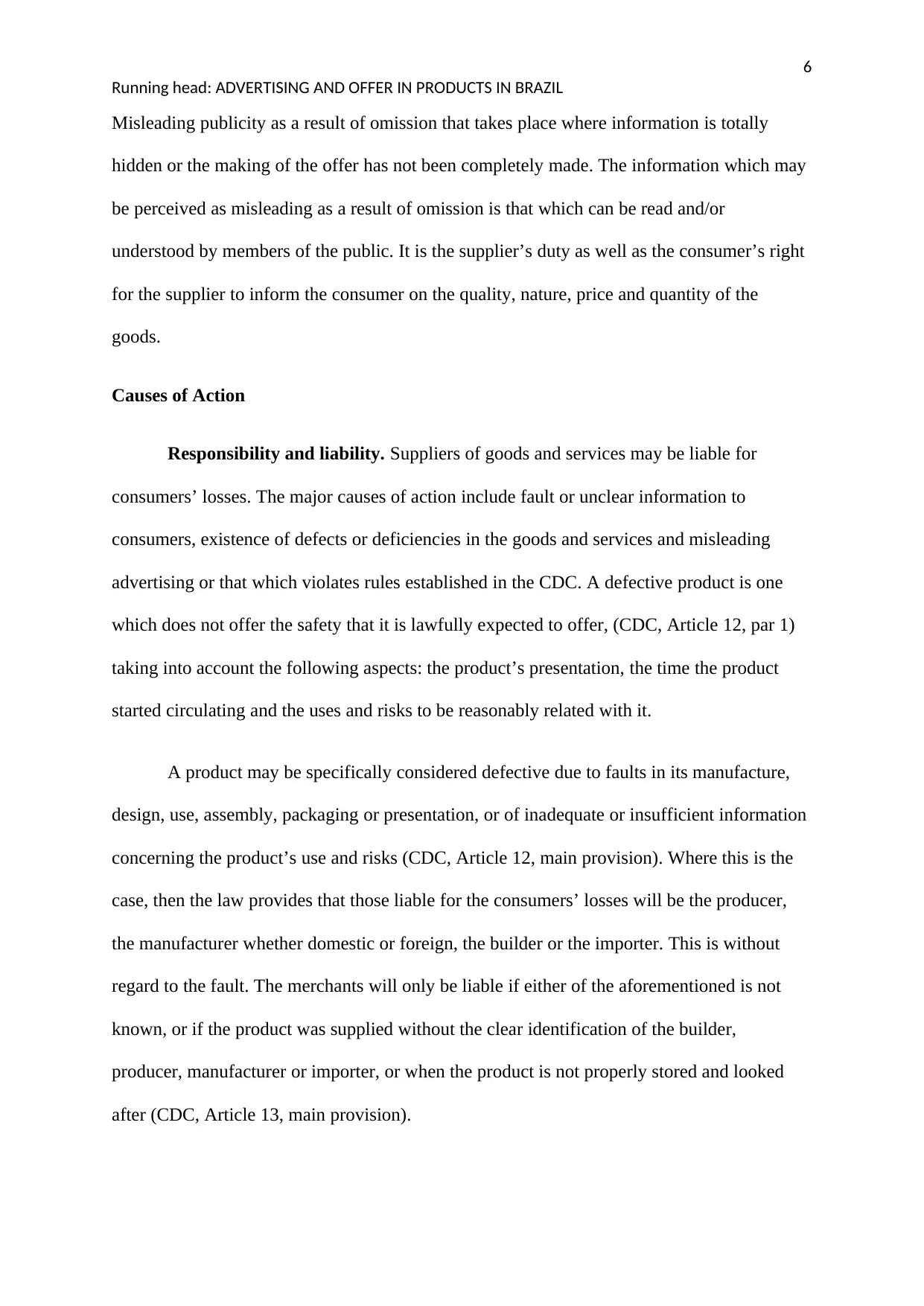
6
Running head: ADVERTISING AND OFFER IN PRODUCTS IN BRAZIL
Misleading publicity as a result of omission that takes place where information is totally
hidden or the making of the offer has not been completely made. The information which may
be perceived as misleading as a result of omission is that which can be read and/or
understood by members of the public. It is the supplier’s duty as well as the consumer’s right
for the supplier to inform the consumer on the quality, nature, price and quantity of the
goods.
Causes of Action
Responsibility and liability. Suppliers of goods and services may be liable for
consumers’ losses. The major causes of action include fault or unclear information to
consumers, existence of defects or deficiencies in the goods and services and misleading
advertising or that which violates rules established in the CDC. A defective product is one
which does not offer the safety that it is lawfully expected to offer, (CDC, Article 12, par 1)
taking into account the following aspects: the product’s presentation, the time the product
started circulating and the uses and risks to be reasonably related with it.
A product may be specifically considered defective due to faults in its manufacture,
design, use, assembly, packaging or presentation, or of inadequate or insufficient information
concerning the product’s use and risks (CDC, Article 12, main provision). Where this is the
case, then the law provides that those liable for the consumers’ losses will be the producer,
the manufacturer whether domestic or foreign, the builder or the importer. This is without
regard to the fault. The merchants will only be liable if either of the aforementioned is not
known, or if the product was supplied without the clear identification of the builder,
producer, manufacturer or importer, or when the product is not properly stored and looked
after (CDC, Article 13, main provision).
Running head: ADVERTISING AND OFFER IN PRODUCTS IN BRAZIL
Misleading publicity as a result of omission that takes place where information is totally
hidden or the making of the offer has not been completely made. The information which may
be perceived as misleading as a result of omission is that which can be read and/or
understood by members of the public. It is the supplier’s duty as well as the consumer’s right
for the supplier to inform the consumer on the quality, nature, price and quantity of the
goods.
Causes of Action
Responsibility and liability. Suppliers of goods and services may be liable for
consumers’ losses. The major causes of action include fault or unclear information to
consumers, existence of defects or deficiencies in the goods and services and misleading
advertising or that which violates rules established in the CDC. A defective product is one
which does not offer the safety that it is lawfully expected to offer, (CDC, Article 12, par 1)
taking into account the following aspects: the product’s presentation, the time the product
started circulating and the uses and risks to be reasonably related with it.
A product may be specifically considered defective due to faults in its manufacture,
design, use, assembly, packaging or presentation, or of inadequate or insufficient information
concerning the product’s use and risks (CDC, Article 12, main provision). Where this is the
case, then the law provides that those liable for the consumers’ losses will be the producer,
the manufacturer whether domestic or foreign, the builder or the importer. This is without
regard to the fault. The merchants will only be liable if either of the aforementioned is not
known, or if the product was supplied without the clear identification of the builder,
producer, manufacturer or importer, or when the product is not properly stored and looked
after (CDC, Article 13, main provision).
⊘ This is a preview!⊘
Do you want full access?
Subscribe today to unlock all pages.

Trusted by 1+ million students worldwide
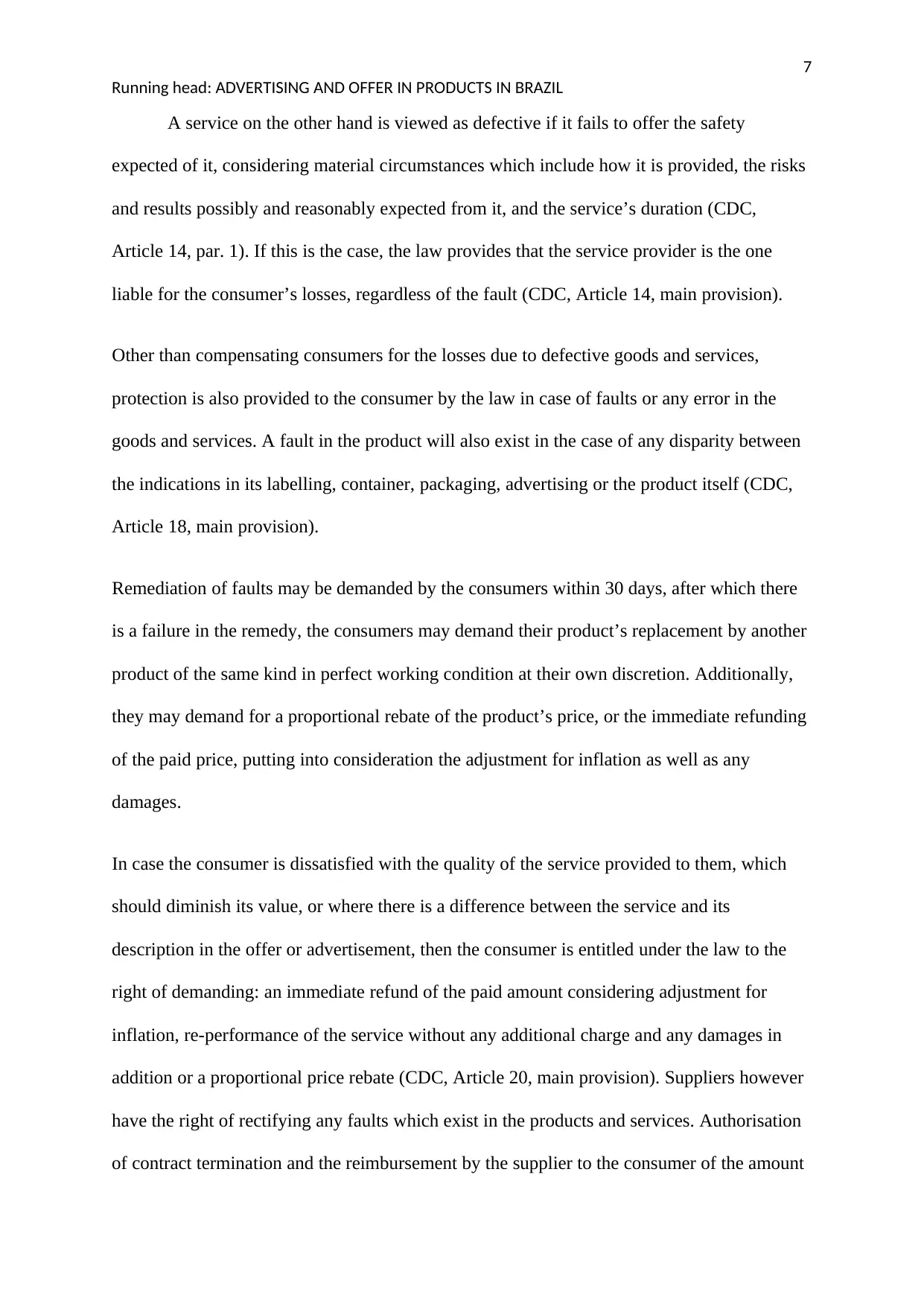
7
Running head: ADVERTISING AND OFFER IN PRODUCTS IN BRAZIL
A service on the other hand is viewed as defective if it fails to offer the safety
expected of it, considering material circumstances which include how it is provided, the risks
and results possibly and reasonably expected from it, and the service’s duration (CDC,
Article 14, par. 1). If this is the case, the law provides that the service provider is the one
liable for the consumer’s losses, regardless of the fault (CDC, Article 14, main provision).
Other than compensating consumers for the losses due to defective goods and services,
protection is also provided to the consumer by the law in case of faults or any error in the
goods and services. A fault in the product will also exist in the case of any disparity between
the indications in its labelling, container, packaging, advertising or the product itself (CDC,
Article 18, main provision).
Remediation of faults may be demanded by the consumers within 30 days, after which there
is a failure in the remedy, the consumers may demand their product’s replacement by another
product of the same kind in perfect working condition at their own discretion. Additionally,
they may demand for a proportional rebate of the product’s price, or the immediate refunding
of the paid price, putting into consideration the adjustment for inflation as well as any
damages.
In case the consumer is dissatisfied with the quality of the service provided to them, which
should diminish its value, or where there is a difference between the service and its
description in the offer or advertisement, then the consumer is entitled under the law to the
right of demanding: an immediate refund of the paid amount considering adjustment for
inflation, re-performance of the service without any additional charge and any damages in
addition or a proportional price rebate (CDC, Article 20, main provision). Suppliers however
have the right of rectifying any faults which exist in the products and services. Authorisation
of contract termination and the reimbursement by the supplier to the consumer of the amount
Running head: ADVERTISING AND OFFER IN PRODUCTS IN BRAZIL
A service on the other hand is viewed as defective if it fails to offer the safety
expected of it, considering material circumstances which include how it is provided, the risks
and results possibly and reasonably expected from it, and the service’s duration (CDC,
Article 14, par. 1). If this is the case, the law provides that the service provider is the one
liable for the consumer’s losses, regardless of the fault (CDC, Article 14, main provision).
Other than compensating consumers for the losses due to defective goods and services,
protection is also provided to the consumer by the law in case of faults or any error in the
goods and services. A fault in the product will also exist in the case of any disparity between
the indications in its labelling, container, packaging, advertising or the product itself (CDC,
Article 18, main provision).
Remediation of faults may be demanded by the consumers within 30 days, after which there
is a failure in the remedy, the consumers may demand their product’s replacement by another
product of the same kind in perfect working condition at their own discretion. Additionally,
they may demand for a proportional rebate of the product’s price, or the immediate refunding
of the paid price, putting into consideration the adjustment for inflation as well as any
damages.
In case the consumer is dissatisfied with the quality of the service provided to them, which
should diminish its value, or where there is a difference between the service and its
description in the offer or advertisement, then the consumer is entitled under the law to the
right of demanding: an immediate refund of the paid amount considering adjustment for
inflation, re-performance of the service without any additional charge and any damages in
addition or a proportional price rebate (CDC, Article 20, main provision). Suppliers however
have the right of rectifying any faults which exist in the products and services. Authorisation
of contract termination and the reimbursement by the supplier to the consumer of the amount
Paraphrase This Document
Need a fresh take? Get an instant paraphrase of this document with our AI Paraphraser
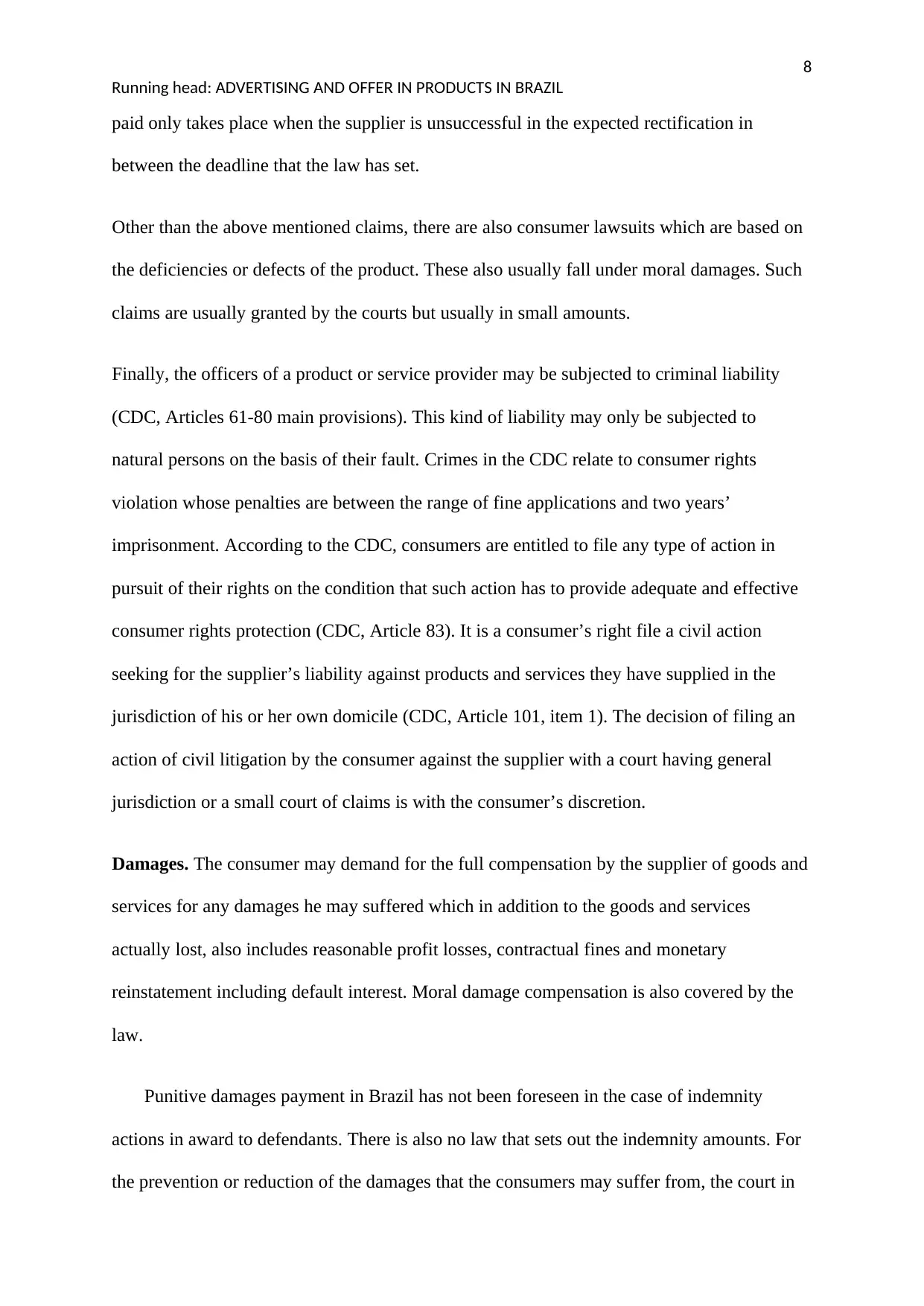
8
Running head: ADVERTISING AND OFFER IN PRODUCTS IN BRAZIL
paid only takes place when the supplier is unsuccessful in the expected rectification in
between the deadline that the law has set.
Other than the above mentioned claims, there are also consumer lawsuits which are based on
the deficiencies or defects of the product. These also usually fall under moral damages. Such
claims are usually granted by the courts but usually in small amounts.
Finally, the officers of a product or service provider may be subjected to criminal liability
(CDC, Articles 61-80 main provisions). This kind of liability may only be subjected to
natural persons on the basis of their fault. Crimes in the CDC relate to consumer rights
violation whose penalties are between the range of fine applications and two years’
imprisonment. According to the CDC, consumers are entitled to file any type of action in
pursuit of their rights on the condition that such action has to provide adequate and effective
consumer rights protection (CDC, Article 83). It is a consumer’s right file a civil action
seeking for the supplier’s liability against products and services they have supplied in the
jurisdiction of his or her own domicile (CDC, Article 101, item 1). The decision of filing an
action of civil litigation by the consumer against the supplier with a court having general
jurisdiction or a small court of claims is with the consumer’s discretion.
Damages. The consumer may demand for the full compensation by the supplier of goods and
services for any damages he may suffered which in addition to the goods and services
actually lost, also includes reasonable profit losses, contractual fines and monetary
reinstatement including default interest. Moral damage compensation is also covered by the
law.
Punitive damages payment in Brazil has not been foreseen in the case of indemnity
actions in award to defendants. There is also no law that sets out the indemnity amounts. For
the prevention or reduction of the damages that the consumers may suffer from, the court in
Running head: ADVERTISING AND OFFER IN PRODUCTS IN BRAZIL
paid only takes place when the supplier is unsuccessful in the expected rectification in
between the deadline that the law has set.
Other than the above mentioned claims, there are also consumer lawsuits which are based on
the deficiencies or defects of the product. These also usually fall under moral damages. Such
claims are usually granted by the courts but usually in small amounts.
Finally, the officers of a product or service provider may be subjected to criminal liability
(CDC, Articles 61-80 main provisions). This kind of liability may only be subjected to
natural persons on the basis of their fault. Crimes in the CDC relate to consumer rights
violation whose penalties are between the range of fine applications and two years’
imprisonment. According to the CDC, consumers are entitled to file any type of action in
pursuit of their rights on the condition that such action has to provide adequate and effective
consumer rights protection (CDC, Article 83). It is a consumer’s right file a civil action
seeking for the supplier’s liability against products and services they have supplied in the
jurisdiction of his or her own domicile (CDC, Article 101, item 1). The decision of filing an
action of civil litigation by the consumer against the supplier with a court having general
jurisdiction or a small court of claims is with the consumer’s discretion.
Damages. The consumer may demand for the full compensation by the supplier of goods and
services for any damages he may suffered which in addition to the goods and services
actually lost, also includes reasonable profit losses, contractual fines and monetary
reinstatement including default interest. Moral damage compensation is also covered by the
law.
Punitive damages payment in Brazil has not been foreseen in the case of indemnity
actions in award to defendants. There is also no law that sets out the indemnity amounts. For
the prevention or reduction of the damages that the consumers may suffer from, the court in
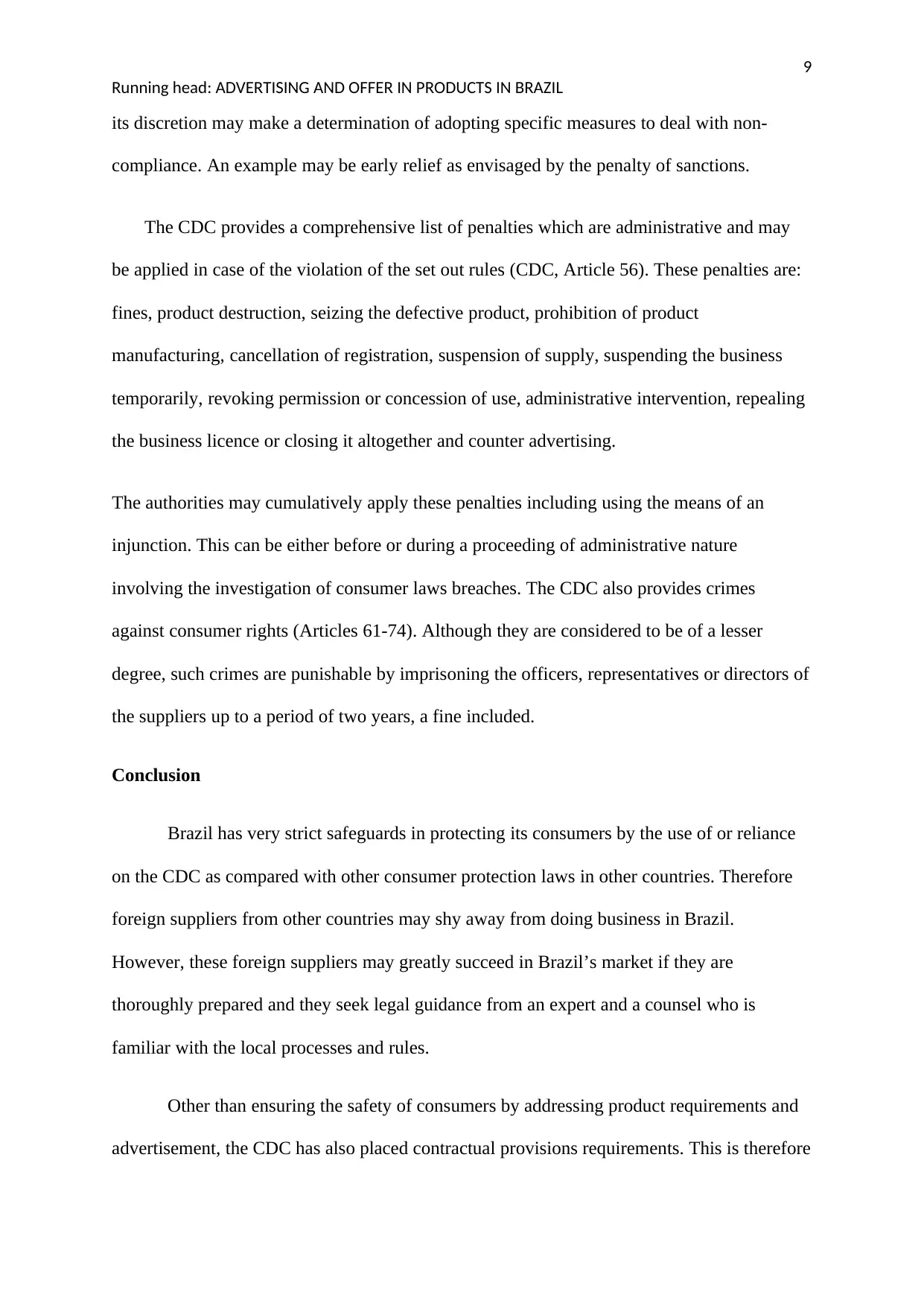
9
Running head: ADVERTISING AND OFFER IN PRODUCTS IN BRAZIL
its discretion may make a determination of adopting specific measures to deal with non-
compliance. An example may be early relief as envisaged by the penalty of sanctions.
The CDC provides a comprehensive list of penalties which are administrative and may
be applied in case of the violation of the set out rules (CDC, Article 56). These penalties are:
fines, product destruction, seizing the defective product, prohibition of product
manufacturing, cancellation of registration, suspension of supply, suspending the business
temporarily, revoking permission or concession of use, administrative intervention, repealing
the business licence or closing it altogether and counter advertising.
The authorities may cumulatively apply these penalties including using the means of an
injunction. This can be either before or during a proceeding of administrative nature
involving the investigation of consumer laws breaches. The CDC also provides crimes
against consumer rights (Articles 61-74). Although they are considered to be of a lesser
degree, such crimes are punishable by imprisoning the officers, representatives or directors of
the suppliers up to a period of two years, a fine included.
Conclusion
Brazil has very strict safeguards in protecting its consumers by the use of or reliance
on the CDC as compared with other consumer protection laws in other countries. Therefore
foreign suppliers from other countries may shy away from doing business in Brazil.
However, these foreign suppliers may greatly succeed in Brazil’s market if they are
thoroughly prepared and they seek legal guidance from an expert and a counsel who is
familiar with the local processes and rules.
Other than ensuring the safety of consumers by addressing product requirements and
advertisement, the CDC has also placed contractual provisions requirements. This is therefore
Running head: ADVERTISING AND OFFER IN PRODUCTS IN BRAZIL
its discretion may make a determination of adopting specific measures to deal with non-
compliance. An example may be early relief as envisaged by the penalty of sanctions.
The CDC provides a comprehensive list of penalties which are administrative and may
be applied in case of the violation of the set out rules (CDC, Article 56). These penalties are:
fines, product destruction, seizing the defective product, prohibition of product
manufacturing, cancellation of registration, suspension of supply, suspending the business
temporarily, revoking permission or concession of use, administrative intervention, repealing
the business licence or closing it altogether and counter advertising.
The authorities may cumulatively apply these penalties including using the means of an
injunction. This can be either before or during a proceeding of administrative nature
involving the investigation of consumer laws breaches. The CDC also provides crimes
against consumer rights (Articles 61-74). Although they are considered to be of a lesser
degree, such crimes are punishable by imprisoning the officers, representatives or directors of
the suppliers up to a period of two years, a fine included.
Conclusion
Brazil has very strict safeguards in protecting its consumers by the use of or reliance
on the CDC as compared with other consumer protection laws in other countries. Therefore
foreign suppliers from other countries may shy away from doing business in Brazil.
However, these foreign suppliers may greatly succeed in Brazil’s market if they are
thoroughly prepared and they seek legal guidance from an expert and a counsel who is
familiar with the local processes and rules.
Other than ensuring the safety of consumers by addressing product requirements and
advertisement, the CDC has also placed contractual provisions requirements. This is therefore
⊘ This is a preview!⊘
Do you want full access?
Subscribe today to unlock all pages.

Trusted by 1+ million students worldwide
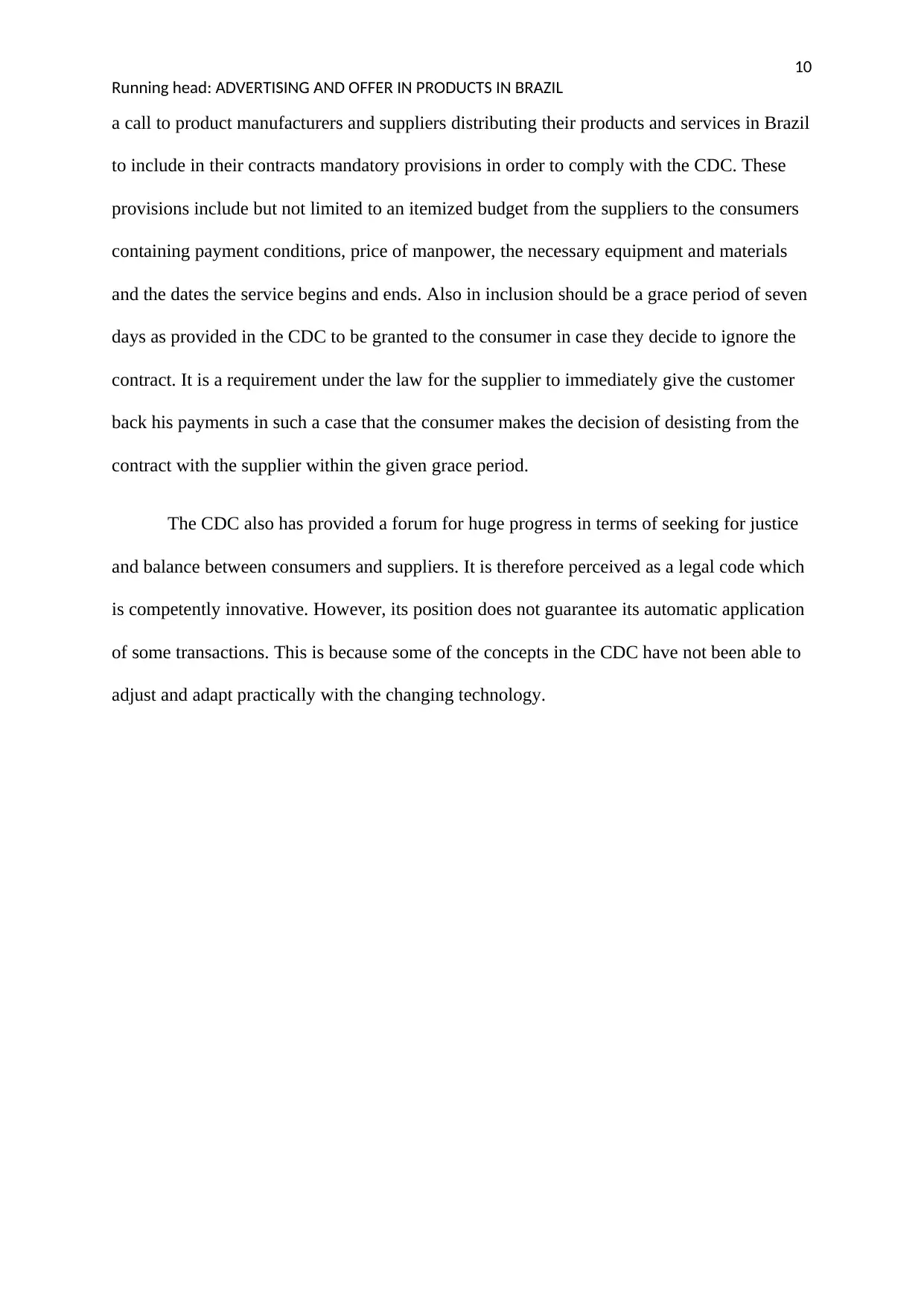
10
Running head: ADVERTISING AND OFFER IN PRODUCTS IN BRAZIL
a call to product manufacturers and suppliers distributing their products and services in Brazil
to include in their contracts mandatory provisions in order to comply with the CDC. These
provisions include but not limited to an itemized budget from the suppliers to the consumers
containing payment conditions, price of manpower, the necessary equipment and materials
and the dates the service begins and ends. Also in inclusion should be a grace period of seven
days as provided in the CDC to be granted to the consumer in case they decide to ignore the
contract. It is a requirement under the law for the supplier to immediately give the customer
back his payments in such a case that the consumer makes the decision of desisting from the
contract with the supplier within the given grace period.
The CDC also has provided a forum for huge progress in terms of seeking for justice
and balance between consumers and suppliers. It is therefore perceived as a legal code which
is competently innovative. However, its position does not guarantee its automatic application
of some transactions. This is because some of the concepts in the CDC have not been able to
adjust and adapt practically with the changing technology.
Running head: ADVERTISING AND OFFER IN PRODUCTS IN BRAZIL
a call to product manufacturers and suppliers distributing their products and services in Brazil
to include in their contracts mandatory provisions in order to comply with the CDC. These
provisions include but not limited to an itemized budget from the suppliers to the consumers
containing payment conditions, price of manpower, the necessary equipment and materials
and the dates the service begins and ends. Also in inclusion should be a grace period of seven
days as provided in the CDC to be granted to the consumer in case they decide to ignore the
contract. It is a requirement under the law for the supplier to immediately give the customer
back his payments in such a case that the consumer makes the decision of desisting from the
contract with the supplier within the given grace period.
The CDC also has provided a forum for huge progress in terms of seeking for justice
and balance between consumers and suppliers. It is therefore perceived as a legal code which
is competently innovative. However, its position does not guarantee its automatic application
of some transactions. This is because some of the concepts in the CDC have not been able to
adjust and adapt practically with the changing technology.
Paraphrase This Document
Need a fresh take? Get an instant paraphrase of this document with our AI Paraphraser
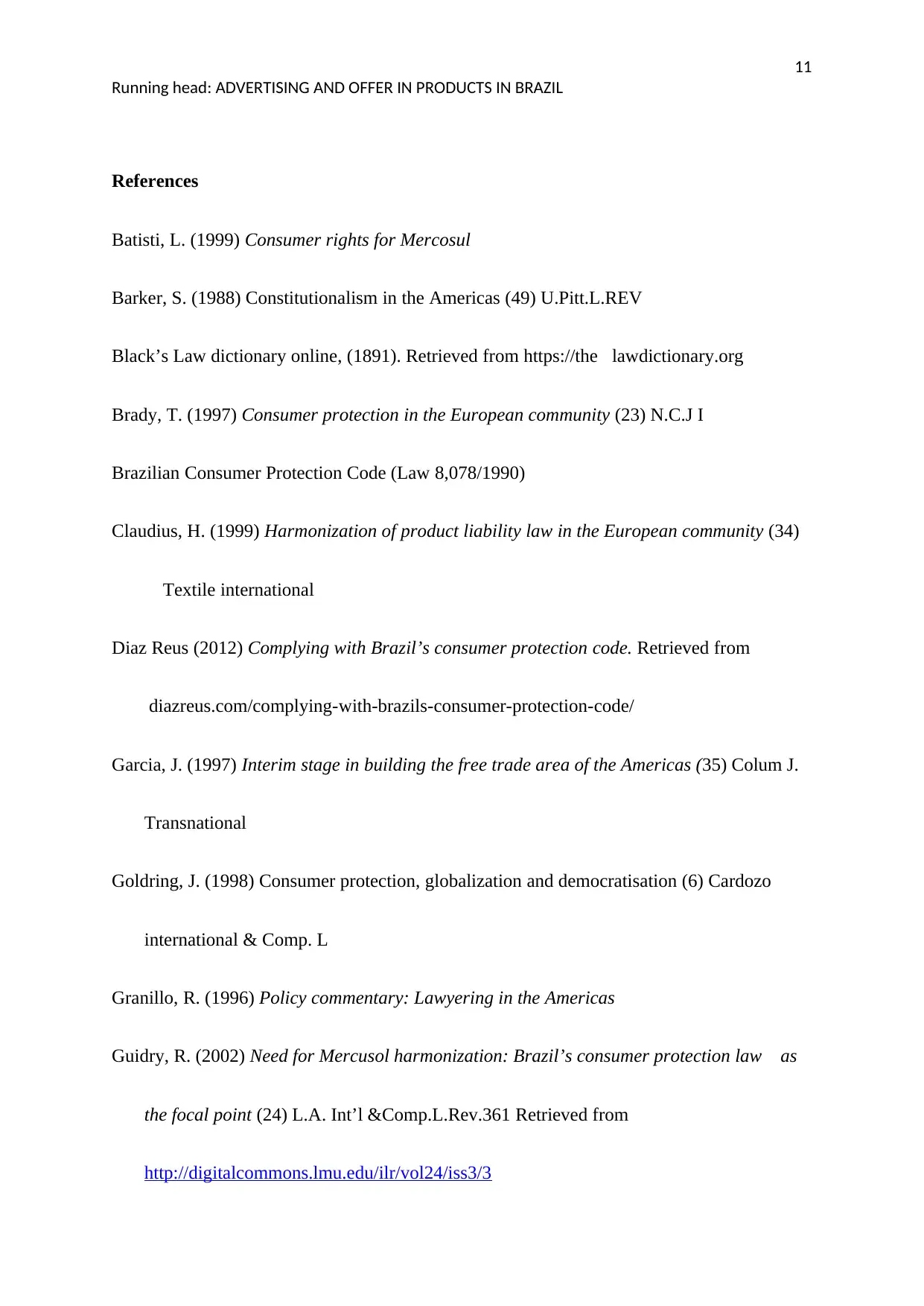
11
Running head: ADVERTISING AND OFFER IN PRODUCTS IN BRAZIL
References
Batisti, L. (1999) Consumer rights for Mercosul
Barker, S. (1988) Constitutionalism in the Americas (49) U.Pitt.L.REV
Black’s Law dictionary online, (1891). Retrieved from https://the lawdictionary.org
Brady, T. (1997) Consumer protection in the European community (23) N.C.J I
Brazilian Consumer Protection Code (Law 8,078/1990)
Claudius, H. (1999) Harmonization of product liability law in the European community (34)
Textile international
Diaz Reus (2012) Complying with Brazil’s consumer protection code. Retrieved from
diazreus.com/complying-with-brazils-consumer-protection-code/
Garcia, J. (1997) Interim stage in building the free trade area of the Americas (35) Colum J.
Transnational
Goldring, J. (1998) Consumer protection, globalization and democratisation (6) Cardozo
international & Comp. L
Granillo, R. (1996) Policy commentary: Lawyering in the Americas
Guidry, R. (2002) Need for Mercusol harmonization: Brazil’s consumer protection law as
the focal point (24) L.A. Int’l &Comp.L.Rev.361 Retrieved from
http://digitalcommons.lmu.edu/ilr/vol24/iss3/3
Running head: ADVERTISING AND OFFER IN PRODUCTS IN BRAZIL
References
Batisti, L. (1999) Consumer rights for Mercosul
Barker, S. (1988) Constitutionalism in the Americas (49) U.Pitt.L.REV
Black’s Law dictionary online, (1891). Retrieved from https://the lawdictionary.org
Brady, T. (1997) Consumer protection in the European community (23) N.C.J I
Brazilian Consumer Protection Code (Law 8,078/1990)
Claudius, H. (1999) Harmonization of product liability law in the European community (34)
Textile international
Diaz Reus (2012) Complying with Brazil’s consumer protection code. Retrieved from
diazreus.com/complying-with-brazils-consumer-protection-code/
Garcia, J. (1997) Interim stage in building the free trade area of the Americas (35) Colum J.
Transnational
Goldring, J. (1998) Consumer protection, globalization and democratisation (6) Cardozo
international & Comp. L
Granillo, R. (1996) Policy commentary: Lawyering in the Americas
Guidry, R. (2002) Need for Mercusol harmonization: Brazil’s consumer protection law as
the focal point (24) L.A. Int’l &Comp.L.Rev.361 Retrieved from
http://digitalcommons.lmu.edu/ilr/vol24/iss3/3
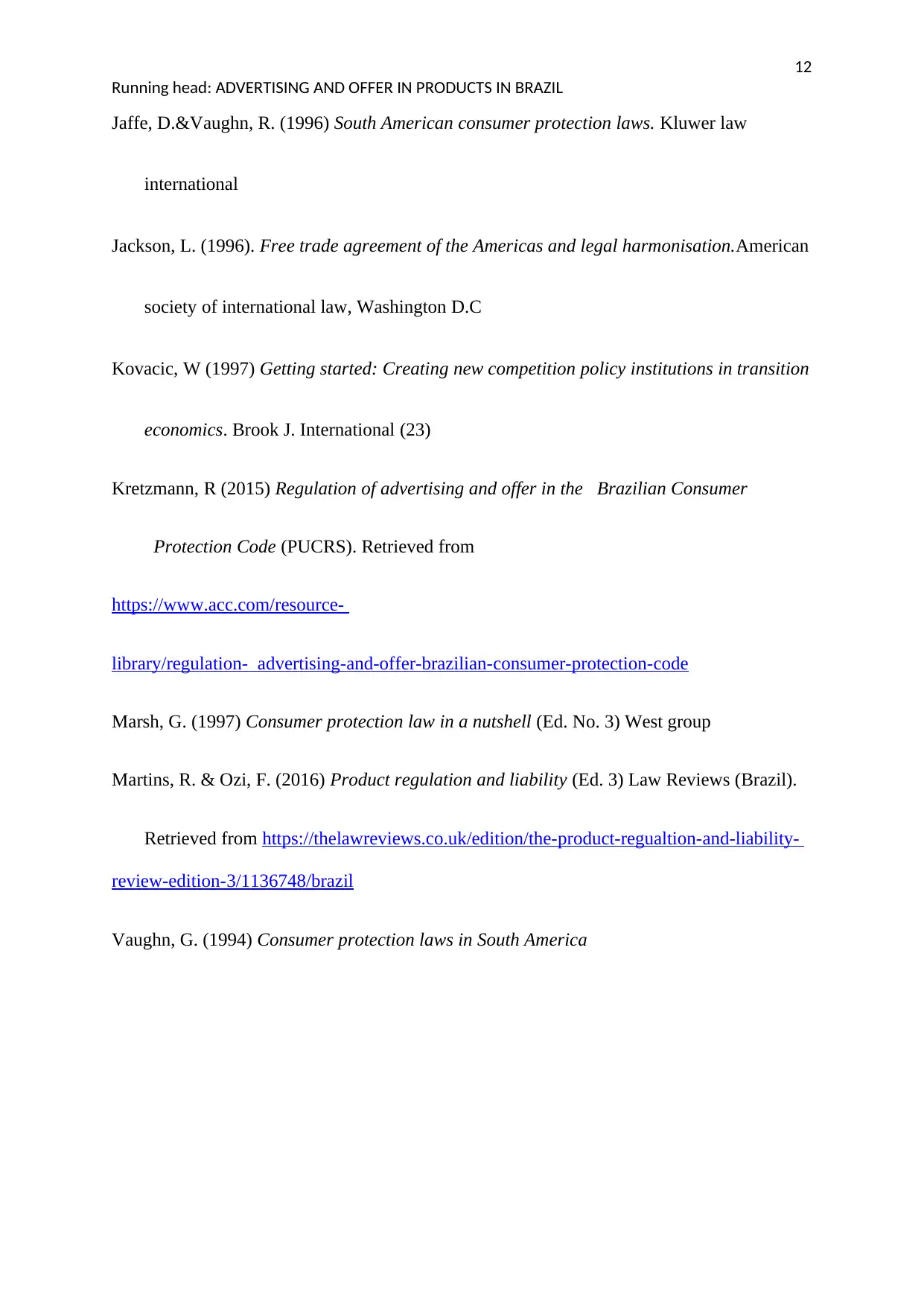
12
Running head: ADVERTISING AND OFFER IN PRODUCTS IN BRAZIL
Jaffe, D.&Vaughn, R. (1996) South American consumer protection laws. Kluwer law
international
Jackson, L. (1996). Free trade agreement of the Americas and legal harmonisation.American
society of international law, Washington D.C
Kovacic, W (1997) Getting started: Creating new competition policy institutions in transition
economics. Brook J. International (23)
Kretzmann, R (2015) Regulation of advertising and offer in the Brazilian Consumer
Protection Code (PUCRS). Retrieved from
https://www.acc.com/resource-
library/regulation- advertising-and-offer-brazilian-consumer-protection-code
Marsh, G. (1997) Consumer protection law in a nutshell (Ed. No. 3) West group
Martins, R. & Ozi, F. (2016) Product regulation and liability (Ed. 3) Law Reviews (Brazil).
Retrieved from https://thelawreviews.co.uk/edition/the-product-regualtion-and-liability-
review-edition-3/1136748/brazil
Vaughn, G. (1994) Consumer protection laws in South America
Running head: ADVERTISING AND OFFER IN PRODUCTS IN BRAZIL
Jaffe, D.&Vaughn, R. (1996) South American consumer protection laws. Kluwer law
international
Jackson, L. (1996). Free trade agreement of the Americas and legal harmonisation.American
society of international law, Washington D.C
Kovacic, W (1997) Getting started: Creating new competition policy institutions in transition
economics. Brook J. International (23)
Kretzmann, R (2015) Regulation of advertising and offer in the Brazilian Consumer
Protection Code (PUCRS). Retrieved from
https://www.acc.com/resource-
library/regulation- advertising-and-offer-brazilian-consumer-protection-code
Marsh, G. (1997) Consumer protection law in a nutshell (Ed. No. 3) West group
Martins, R. & Ozi, F. (2016) Product regulation and liability (Ed. 3) Law Reviews (Brazil).
Retrieved from https://thelawreviews.co.uk/edition/the-product-regualtion-and-liability-
review-edition-3/1136748/brazil
Vaughn, G. (1994) Consumer protection laws in South America
⊘ This is a preview!⊘
Do you want full access?
Subscribe today to unlock all pages.

Trusted by 1+ million students worldwide
1 out of 12
Related Documents
Your All-in-One AI-Powered Toolkit for Academic Success.
+13062052269
info@desklib.com
Available 24*7 on WhatsApp / Email
![[object Object]](/_next/static/media/star-bottom.7253800d.svg)
Unlock your academic potential
Copyright © 2020–2025 A2Z Services. All Rights Reserved. Developed and managed by ZUCOL.




